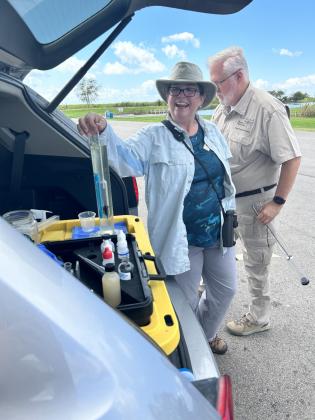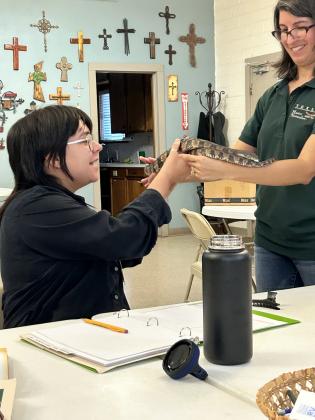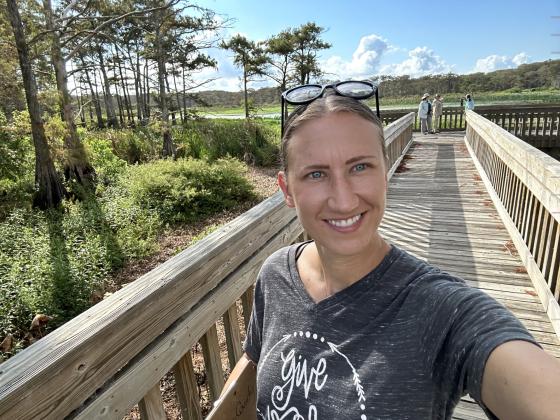New Spring Training Offered for Prospective Texas Master Naturalists in Liberty
LIBERTY — I just completed my initial training in the Texas Master Naturalist program with the Lower Trinity Basin Chapter, and let me tell you — I just can’t get enough.
The classes were held most Thursday evenings in downtown Liberty for approximately three months. The three-hour classes were cozy and quaint — as only a few people signed up for the fall session.
The fact that the classes were so small made it feel all the more special. I felt as if I was in a prestigious senior-level course in college, yet there were no quizzes or tests to fret over. All the learning was for your own enjoyment, so you could turn around and share what you learned with others.
Before each class, a few chapters from our textbooks were assigned on the topics to be discussed that week. Each class covered a different topic and was taught by varying instructors who were experts in their respective fields.
Their inspirational lectures brought the topics to life as the images of native trees, peculiar fish, or unique mammals jumped off the pages of our textbook. The details about geology, water systems and weather phenomena left us in wide-eyed wonder. The lectures far exceeded what was discussed in the text, serving only as an appetizer for what was to come.
Next were the field trips. We took hikes and winding car rides to places we never thought to visit. To our delight, we were met by even more field experts who took us on mini adventures into their daily lives as rice farmers, wildlife biologists, and land managers, showing us the ins and outs, the highs and lows and the breakthroughs and setbacks concerning conservation that affect all of us.
In the final class, the instructors challenge you to take one of the topics that interest you and create your own short interpretive lecture to share with the class. My topic of choice was the “conservation of beneficial insects,” and as a result, I have felt the protégé effect.
By teaching others what I learned, I craved deeper understanding. It even changed how I interact with nature. In the past, when one of my children shrieked that an insect was inside our home, I would run to the rescue with a tissue in hand, whereas now, I shout, “Ooh, what kind is it?!”
Secondly, I have found myself sharing facts with everyone I know. For example, at a networking luncheon recently, instead of sharing marketing tactics with my table mates, I found myself telling the others that carpenter bees are not fuzzy, they actually have a “shiny hiny!”
The best part of the entire program is that you learn about the ecology in your region and you develop a newfound respect for the woods, marsh and prairies you have always known.
The Texas Master Naturalist Program’s mission is to develop a pool of trained volunteers that are able to provide education, outreach and service dedicated to the beneficial management of natural resources and natural areas within their communities for the State of Texas.
Many organizations we assist heavily rely on Texas Master Naturalist volunteers to carry out youth education programs such as; assisting parks with daily tasks, maintaining nature centers and natural areas; and providing leadership in local natural resource conservation efforts. In all, a pool of dedicated and well-informed volunteers is often cited as a limiting factor for community-based conservation efforts.
Master Naturalist Trainees must successfully complete the provided training with at least 40 hours of combined field and classroom instruction through a Texas Master Naturalist Chapter.
While completing the training above, the candidate serves at least 40 hours of volunteer service in their community and engages in 8 hours of advanced training to advance their knowledge and connection with their ecoregion.
In subsequent years, the candidate must complete another 8 hours of advanced training and donate 40 hours of volunteer service to maintain their certification (or to re-certify) as a Texas Master Naturalist.
The class will start Saturday, Feb. 10, and finish in early May. The fee is $175, with a discount for couples if they want to share the book. There is also a possibility of financial assistance determined on an individual basis. The minimum age for the class is 18, as mandated by the state.
For an application please email lowertrinitybasin@gmail.com or visit Lower Trinity Basin Chapter – Texas Master Naturalist site



